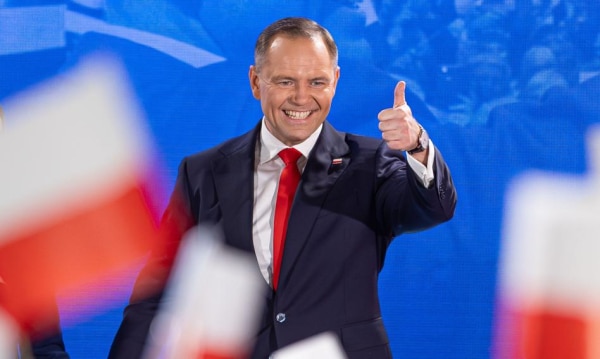The government should explain itself, settle its mistakes and change its strategy. It must take actions that will translate into an increase in the standard of living of its citizens, said Prof. Przemysław Sadura from the Faculty of Sociology of the University of Warsaw to PAP. He added that it is difficult to understand why it has implemented so few plans so far.

Polish Press Agency: What can and should the government do now?
Prof. Przemysław Sadura: First of all, he should start working, using all the possibilities. He cannot change Poland with laws, so he has to act with regulations, which is what he should have done so far.
See alsoHow artificial intelligence will affect the work of accountants
PAP: But he didn't do that.
PS: Why was there a belief that it was better to do nothing, not work on anything and wait for the presidential elections, and then promise acceleration? No one is able to understand this. First of all, Poles do not understand this and that is why they voted as they did.
PAP: Some say that the government should now try to pass bill after bill, despite possible vetoes by the president.
PS: Legislative work should continue. When the president vetoes, the bill can be modified. Bills can also be prepared and wait in the freezer. The problem is that they were not prepared. This must change. President Andrzej Duda did not veto too many bills because he did not have many opportunities to do so.
Read also
The fish rots from the head down, and we let ourselves be carried away by the wave. Where does the division in Polish society come from?
Each ministry must try to find agency with the tools it has. The president has weak legitimacy in the Polish system; the only thing he can do is veto.
PAP: What tools should ministries use? What should they focus on, what should they speed up?
PS: Everything needs to be sped up except for the issues of settlements. Poles were tired of them because they felt that the steam was going down the drain. The government has so far been mainly concerned with the settlements of the previous government, which are going slowly because it is difficult to make real settlements in such a short time given the huge scale of abuses by the old team. However, it has not been concerned with the current administration of the affairs of Poles.
Donald Tusk's government should now carry out broad actions that will have an impact on improving the situation of Polish households. Poles declared that over the last year and a half, most of them have either noted regression or stagnation. These are their feelings that are the main determinant of voting behavior.
PAP: How should the government communicate with society?
PS: First of all, he should create and explain his strategy and appoint a spokesman, because these areas have been neglected so far. I cannot answer the question of how to do it, it is the task of Prime Minister Tusk and individual ministers.
I understand that working conditions were difficult, but it is hard for me to understand that so little has been done in a year and a half. On the anniversary of the October elections, we were already sounding the alarm that the democratic electorate was in a pessimistic mood, disillusionment and demobilization. The democratic camp is losing people who mobilized then – and no action has been taken to counteract this. Similarly, nothing has been done to strengthen the government's efficiency and improve its reception among voters.
PAP: How should the government behave towards the new president?
PS: The ideal strategy in this type of social game is altruistic “tit for tat”. This means that only when one side strikes, the other responds. On the other hand, the government should send a positive signal that it is ready to cooperate.
It is hard to say what kind of president Karol Nawrocki will be. Some say that even Law and Justice does not know. A similar situation may occur as with the head of the Supreme Audit Office, Marian Banaś, over whom the party quickly lost control. We will see whether he will be a loyal president of PiS, or maybe he will change sides and be more of a president of the Confederation, or maybe he will only veto laws and make the work of the government difficult.
Despite this, the government must implement changes in all areas of public services that it has in its hands. Strengthening civil and democratic society is key to building resistance to right-wing populism. PiS has consistently invested in right-wing civil society and right-wing social organizations dealing with culture and education, among other things, during its eight years in power. A democratic government should, in turn, invest in a real, democratic civil society. We need to start thinking more broadly – not just in terms of the political party system.
Today, there are ideas not only for the reconstruction of the government, but also for its deconstruction, and voices calling for the dismissal of the prime minister. I do not know what purpose this would serve. The government should explain itself, settle for its mistakes and change its strategy, but not drive itself into a crisis.
PAP: What could the democratic camp do to create a more democratic society?
PS: The government is not supposed to create it, but to support its functioning, provide resources to democratic organizations and institutions.
A wide inflow of funding should at the same time be supported by a mechanism for evaluating and enforcing what the money is spent on. It is not about organizing programs in the style of “Willa Plus”, but directed at other organizations. It is about useful activities supporting valuable organizations.
Improving the functioning of public services and supporting civil society are the most urgent needs. The government must take actions that translate into an increase in the standard of living and satisfaction of citizens. Good communication, not manipulative propaganda, is also a key area, but first you need to have something to communicate.
PAP: How did it happen that such a little-known man was elected president again?
PS: This was mainly due to three issues. First, the disappointment of the democratic electorate with the government's actions , which resulted in a decrease in motivation. Rafał Trzaskowski was burdened by the moods towards the government – they caused him to squander the huge support he had at the beginning.
Secondly, Nawrocki was strengthened by the weakness of the competition . Trzaskowski's campaign was poorly run. The staff had built a bad strategy. For incomprehensible reasons, they focused on courting the right-wing, confederate electorate. The conjuring of reality that the progressive candidate had adopted the views of a conservative was unbelievable and at the same time demobilized the liberal electorate. Trzaskowski was losing debates, he looked tired. It was only in the middle of the campaign before the second round that he did better.
And thirdly, the voters were not necessarily motivated by a desire to vote specifically for Nawrocki, but against Trzaskowski and the government .
The boomerang effect worked, which I confirmed in my research. It consists in the fact that intrusive attempts to convince someone of a specific position can have the opposite effect – there is a tendency to choose the opposite option. This is especially visible among young voters. Under pressure from the liberal media, which intensively publicized facts from Nawrocki's past, some of them voted against these messages – in defiance.
It is good that investigative journalists did their job, but changing news programmes into propaganda leaflets that just kept repeating these allegations was a wrong move.
Interviewed by Zuzanna Piwek (PAP)
zzp/ teddy bear/ amac/






